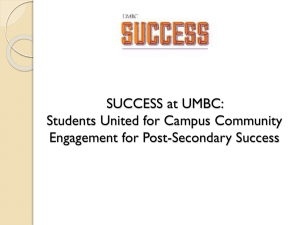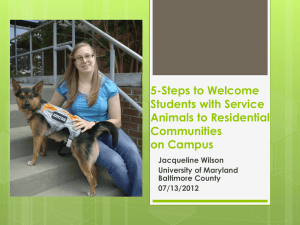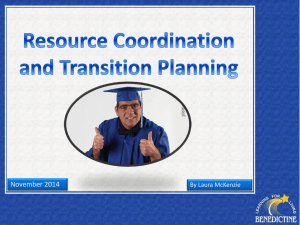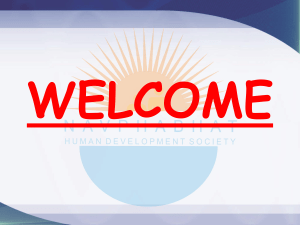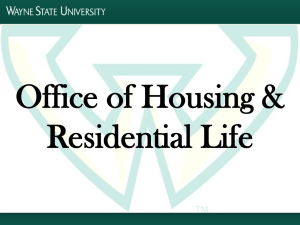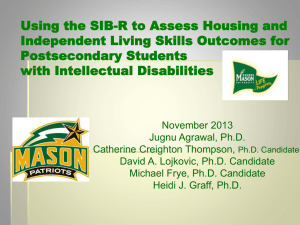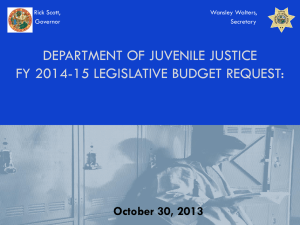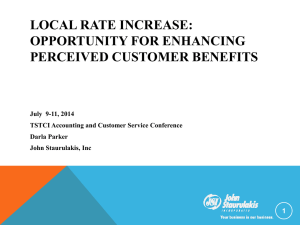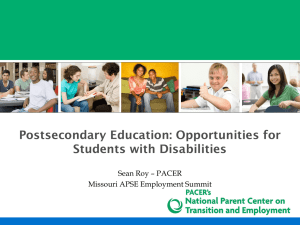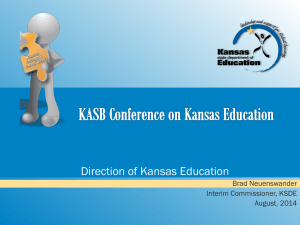SUCCESS: UMBC - Maryland Transitioning Youth
advertisement
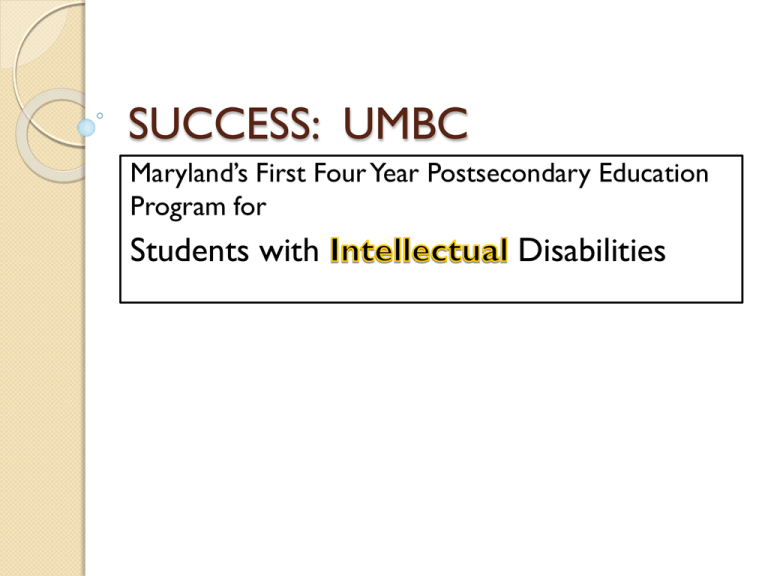
SUCCESS: UMBC Maryland’s First Four Year Postsecondary Education Program for Students with Disabilities Nationally Over 250 programs available In 41 states 2-year: 38% 4-year: 51% Tech/Trade School: 12% Residential Options 39% Data Youths with ID who participated in postsecondary education were 26% more likely to exit the VR program with employment and they earned a 73% higher weekly income. Migliore, A. & Butterworth, J., 2008. Postsecondary Education and Employment Outcomes for Youth with Intellectual Disabilities. DataNote Series, Data Note XXI. Boston, MA: Institute for Community Inclusion. Value of Postsecondary Experience for Individuals with Intellectual Disabilities: Enhanced employment outcomes Opportunity to develop problem solving skills and independence Ability to access adult learning opportunities and develop a desire for lifelong learning Expanded social networks Opportunity to connect learning to personal desired outcomes Socially valued roles and experience Federal Efforts The Higher Education Opportunity Act Amendments 2008 Allows students with ID attending Comprehensive Transition postsecondary programs (CTP) to be eligible for: Pell Grants Supplemental Educational Opportunity Grants Federal Work-Study Programs History in Maryland Dual enrollment programs for18-21 to attend community college while in high school –NO 4 year post 21 program Interest from parents in DC metro area due to George Mason University LIFE Summer 2011 MDOD approached UMBC Shriver Center about a 4 year program Criteria Students must: Be a full time resident of Maryland and have an intellectual disability Have exited high school with a certificate, and be at least 21 and no older then 24. Be able to read at a 3rd grade level (minimum requirement) Have knowledge of basic mathematics and the ability to use a calculator Have knowledge of basic keyboarding skills and the ability to use a computer Exhibit conduct and behavior that are age appropriate Have the ability to function independently for a sustained period of time Have the ability to be successful in competitive employment situations Have the desire and motivation to complete a postsecondary program Have a willingness to complete all assignments with support Additional Discussion Designed for students who could not otherwise access higher education. Does not result in credits or a degree Intended for students with Down Syndrome and similar intellectual disabilities First and possible second year are defined in terms of coursework but hope to allow individuals to select and engage in exiting classes in future years. Funding Original intent was that families would cover all costs Families had limited time to save Plan is to get approval as a Comprehensive Transition Plan to qualify for FAFSA For current cohort, DDA is paying $8000 and DORS $2000 to cover the tuition and fees.* review of DDA Guidance Families are responsible for transportation Residential Residential is an important component of the SUCCESS Program Residential component creates the unique opportunity for independence to develop Priority will be given to students whose families commit to the residential component Cost of residential component is anticipated to be $20,000 or more. See the Housing Options Fact sheet for details. Not an upfront cost—payable over the course of the year and does include live in residential support staff. Families need to understand there is NO FUNDING FOR RESIDENTIAL, nor will there be. 2012 Cohort 6 students from Montgomery, Prince George’s, Howard, and Baltimore Counties. All commuters 9:45-4:00 pm Monday through Friday, follows UMBC Academic Calendar Curriculum includes: First Year Seminar, Service Learning Project, On Campus Internship, Independent Living course, Health and Wellness, Personal Awareness 2013-2014 Applications will be available in February 2013 Students to be accepted on a rolling basis Discuss with families now and encourage families to save and explore options such as 529 plans, Residential component will be private pay. Residential is critical in mastering independent living skills Long term Cohort of 6-8 per year, each cohort attends for 4 years and exits with certificate Total of 32 students at UMBC at any given time Ability to access Federal Financial Aid On campus housing Exploring potential career tracks, individualization and integration into existing courses of interest FOR MORE INFORMATION INCLUDING COSTS, CURRICULUM, AND FAQ’S Shrivercenter.org/SUCCESS Families with questions should contact: Nan Brittingham: nbrittingham@mdod.state.md.us For questions regarding DDA funding, contact: Sequaya Tasker, Coordinator of Children, TY and Aging Services, DDA, 410-767-8688 Sequaya.Tasker@maryland.gov Jade Gingerich Director of Employment Policy MDOD 410-767-3660 jgingerich@mdod.state.md.us
